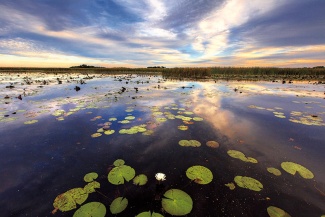The report, released in June from the National Academies of Sciences, Engineering and Medicine, calls for improved understanding of the Gulf Coast system to promote resilience of coastal communities and ecosystems under rapidly changing environmental conditions, such as sea-level rise, flooding, marsh and wetland loss and subsidence.
The committee that drew up the report included researchers from around the country, including two from Tulane—Vokes Geology Professor Torbjörn Törqvist and adjunct professor Alex Kolker.
The report recommends that the National Academies’ Gulf Research Program create an integrated program that focuses on understanding the evolution of the coupled coastal system. The program should support collaborative, multidisciplinary research teams and deliver easily accessible observational data and model results, the report says.
“Because of the long-term changes that we’ve experienced in the Gulf and that are expected to continue as sea level rises, now is the time to think about long-term plans as to how the physical system and human system are likely to evolve together,” said Kolker, who is also an associate professor with the Louisiana Universities Marine Consortium.
tulane.it/GRP-report
Understanding the Gulf Coast Is Key to Resilience
A national report on the future of the Gulf Coast draws heavily on the work of two Tulane University scientists who have spent most of their careers studying coastal systems in Louisiana and around the world.
A national report on the future of the Gulf Coast draws heavily on the work of two Tulane University scientists who have spent most of their careers studying coastal systems in Louisiana and around the world.

Photo courtesy U.S. Fish and Wildlife Services






























































